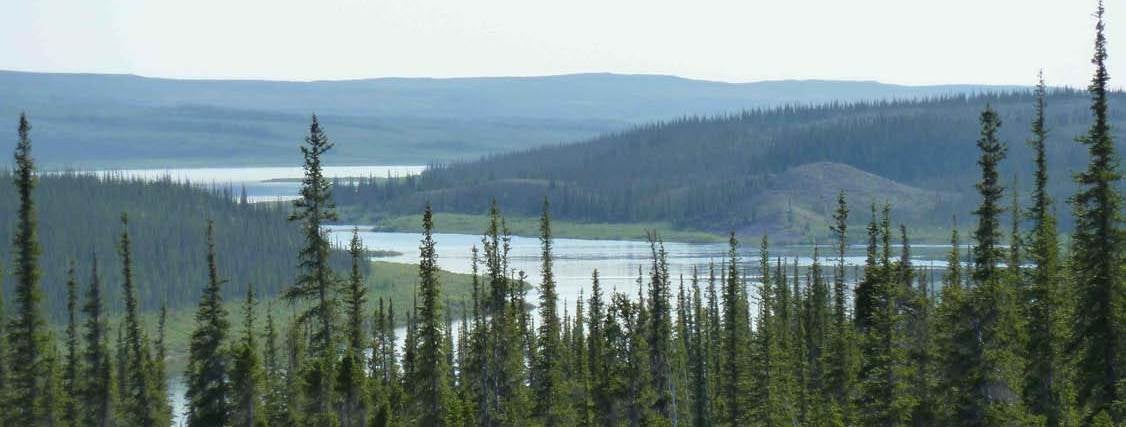
Background
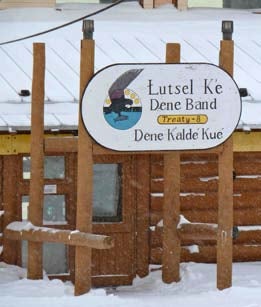
The initial phase of study (2008-2011) involved working with canoeists and Inuit residents of Qamani’tuaq (Baker Lake, Nunavut) to document knowledge about the Thelon, and to share this knowledge within and between groups. The second phase (2012) involved sharing outcomes of the initial study with representatives of the Lutsel K’e Dene First Nation (LKDFN). In November 2012, Bryan Grimwood visited Lutsel K’e to meet community representatives, including the Wildlife, Lands, and Environment Committee (WLEC). These meetings generated interest in developing a third project phase that focused on Dene knowledge, uses, and relationships associated with the Thelon River. After his visit, Bryan Grimwood maintained regular contact with WLEC Manager Mike Tollis while preparing a funding proposal to support this research with Lutsel K’e. Gita Ljubicic, an associate professor at Carleton University with extensive experience working with northern communities, was also involved in preparing the proposal. In June 2013, this new, third component of the Thelon River study was awarded two years of funding (2013-2015) from the Social Sciences and Humanities Research Council of Canada (SSHRC). As written in the proposal, the purpose of the research is to work with the community of Lutsel K’e in responding to contexts of Arctic change by revealing and restoring Denesoline relationships with the Thelon River watershed. The project is based on three objectives:
- To foster and celebrate Denesoline cultural livelihoods by recording, experiencing, and exchanging local and traditional knowledge associated with the Thelon River watershed;
- To synthesize, analyze, and interpret Thelon River watershed policies, archives, and media productions for meaningful use within the community context of Lutsel K’e;
- To plan and pilot a knowledge exchange land camp that will: a) involve collaborations between Dene, Inuit, university researchers, and other Thelon stakeholders; and b) become the basis for future collaborative research.

1. Celebrating and promoting Denesoline Knowledge
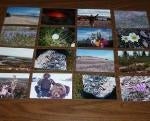
2. Synthesizing and integrating knowledge for community use
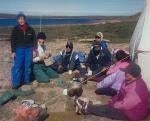
3. Land camp for knowledge exchange and planning future research
Workshop objectives
An important first step in phase three of Picturing the Thelon was for university researchers and community representatives to communicate and work together on planning and initiating the research. Accordingly, Bryan Grimwood and two University of Waterloo graduate students, Lauren King and Ally Holmes, visited Lutsel K’e for five days in December 2013. The main purpose of their visit was to participate in and facilitate a research planning workshop with members of the WLEC and other LKDFN representatives. The workshop occurred in the Council Chambers on Thursday, December 5 and Friday, December 6 from 10:00 AM – 4:30 PM each day. Objectives of the workshop were to:
- Develop a solid foundation for future work together by building relationships between the community of Lutsel K’e and university researchers;
- Collaborate on clarifying expectations priorities, and timelines about the research project and associated land camp, including the various roles to be played by community and university researchers; and
- Generate feelings of excitement about the picturing the Thelon River research project.
The remainder of this report summarizes the results of the workshop.
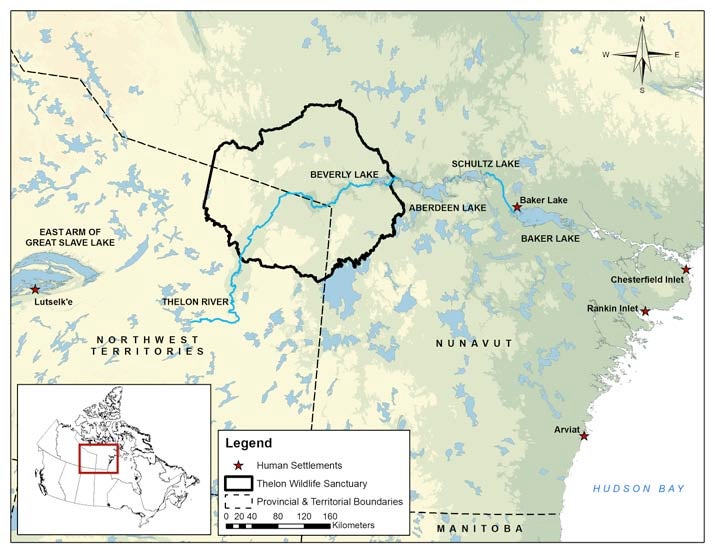
Figure 1. The Thelon River Watershed
Workshop overview
Day 1 (December 5, 2013)
Morning
Introductions were made informally as workshop participants arrived and were offered coffee, tea, and snacks. Gita Ljubicic was unable to travel to the community so a conference call set up was used to include her in the first part of the workshop. Sam Boucher opened the meeting with a prayer. This was followed by more formal introductions. Each participant was asked to introduce him/herself and describe a personal experience associated with the Thelon River or with research. Gita Ljubicic described her background working on collaborative research projects with Inuit communities in Nunavut, and explained that her role in this project would be to provide support and guidance when necessary. Bryan Grimwood presented a broad overview of the research project Picturing the Thelon River. This included information and photographs from work carried out with river tourists (commercially guided canoeists) and Inuit from Qamani’tuaq (Baker Lake, Nunavut). Next, Bryan introduced the current project entitled Restor(y)ing Denesoline relations en route to the headwaters, and reviewed his previous consultation visit to Lutsel K’e (November 2012), regular communications with Mike Tollis over the past year, and the development of a successful SSHRC research grant. In this overview, Bryan emphasized the collaborative dimensions of the research and that the substance and processes the project could be adapted based on community input received during this workshop. The workshop agenda was then introduced and Bryan’s role as workshop facilitator discussed. It was identified that the graduate students, Lauren and Ally, were involved in order to make introductions, learn, observe, and take notes and photographs.
The morning concluded with an activity based on the question: “What would you like people to know about the Thelon River?” Workshop participants were invited to consider this question for a few minutes and write down individual responses on a note pad. Participants then shared their responses with the entire group, explaining and elaborating on details when appropriate. All responses were recorded on chart paper to create a compiled list of responses from the group. The list of responses was posted on a wall for future reference.
Afternoon
The afternoon session began around 1:30 pm. Coffee, tea, and snacks were made available as people returned from the lunch break. The second half of the day was organized into two interactive brainstorming activities. The first activity was designed to identify community perspectives on what counts as responsible and respectful research. It focused on the question: “What is needed for a research project to be considered ‘good’ or ‘respectful’ research?” Individually, participants responded to this question by writing down key words or short phrases on cue cards. Participants then shared their ideas with the group by posting their cue card responses on a white board. Cue cards containing similar ideas were grouped together by the participants. A discussion of key issues, concerns, and themes followed and Bryan made additional notes on the white board to highlight these in relation to the contents of the cue cards. The afternoon break provided an opportunity to synthesize and re-organize cue cards and notes into a framework for doing “good research that can help being a dene on the land”.
The other afternoon activity was designed to identify research priorities with respect to the Thelon River. It focused on the question: “What are your main priorities for the Thelon River research project?” A second sub-question was: “What would you like to know more about in relation to the Thelon River?” This activity began with another cue card exercise. Participants responded to the questions by writing down key words or short phrases. These individual responses were shared with the group and posted on the white board. Next, participants were each given 10 blue stickers and asked to attach these to the cue cards containing content that they deemed most important. If a participant felt that a cue card was especially important, he/she could attach more than one blue sticker to it. At the end of the exercise, cue cards with the most number of blue stickers represented the main research priorities. The opportunity was taken to synthesize cue cards into thematic categories and discuss these with the group. By the end of the afternoon, the workshop participants had identified seven interrelated research priorities for the Thelon River project:
- Future orientations: youth connections
- Play a leading role in Thelon governance and management
- Land camp experience
- Dene connections with Inuit
- Changes observed and responses to them
- Thelon stories
- Identifying and understanding different ways of using the Thelon.
Day 2 (December 6, 2013)
Morning
The second day of the workshop began with informal conversations over coffee, tea, and snacks. Once everyone settled in, Bryan reviewed the outcomes of Day 1 and invited participants to identify and discuss research methods that might be useful to addressing the research priorities. Herman Catholique joined the morning discussion and shared a story about the Thelon that was told to him by his grandfather.
The next part of the morning focused on the headwaters land camp component of the research project. Working in small groups of two to four people, and provided with coloured markers, pens, and chart paper, participants were asked to draw what the land camp experience might look at. The intention here was for participants to communicate different expectations and clarify the who, what, where, when, why, and how of the land camp experience. Participants used the drawing exercise to create and discuss their visions together, and then shared these with the larger group by describing the details contained within their drawings.
Mike Tollis graciously organized a lunch to be brought in for all workshop participants. Just after noon, we enjoyed delicious stew, fresh bannock, and jello desert.
Afternoon
After lunch, there was a clear sense from all participants that the workshop had generated important information about working together on a locally relevant research project about the Thelon River. To bring the workshop to a close, the group spent the afternoon discussing ‘next steps’ for moving forward. This involved clarifying expectations about community research protocols, reporting to the community, and authorship of academic publications. Discussions also focused on: how workshop participants wanted to contribute to the project as it moves forward; when members of the university research team should return to Lutsel K’e; timelines for carrying out different aspects of the research; what outcomes or products (other than academic publications) from the research the community wants to see; opportunities for securing additional funding to support the headwaters land camp; community ownership over knowledge generated, data collected, and how the community is represented; and how best to maintain open lines of communication. It was agreed upon that an important next step was for Bryan to develop this workshop report, along with a plan and timeline for carrying out the research, which would be forwarded to the workshop participants for review prior to submitting a research license application to the Aurora Research Institute.
Workshop outcomes
Several key outcomes emerged from the two-day workshop. These are summarized below and organized under subheadings that relate to the various activity and discussion topics of the workshop.
1. What should people know about the Thelon River?
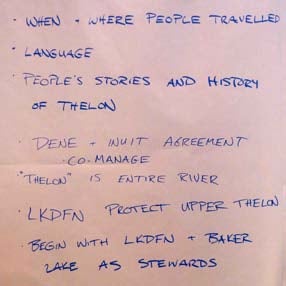
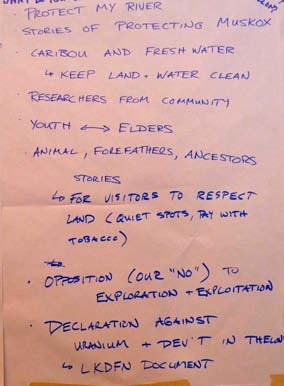
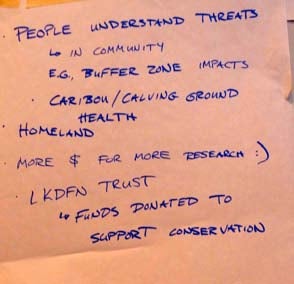
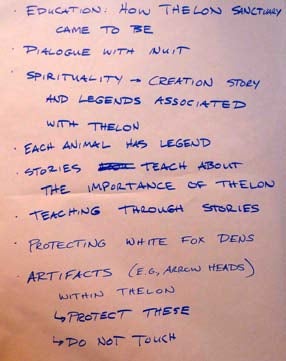
Workshop participants identified several responses to the question “What would you like people to know about the Thelon River?”
Notes taken to record these responses are shown on the left-hand sidebar.
Participants emphasized that Dene stories about the Thelon River must be communicated within and beyond Lutsel K’e.
These stories involve both historical and contemporary relationships to the Thelon, and relate to:
- ancestors
- sacred animals like caribou, muskoxen, and white fox
- how the Thelon Wildlife Sanctuary came to be
- place names and traditional uses
- respecting the land while travelling; and
- the role of Lutsel K’e Dene and Baker Lake Inuit as primary stewards of the entire river.
Telling Dene stories of the Thelon was identified as a way to teach young Dene and visitors about protecting the river environment (inclusive of animals, caribou calving grounds and migration routes, ancestors, drinking water, artifacts like spearheads and caches) from resource exploration and exploitation.
2. What does ‘good’ or ‘respectful’ research look like?
Participants’ individual responses to this question were recorded on cue cards and grouped into initial themes on a white board. Additional notes were made to reflect information and ideas expressed in follow-up discussion. Figure 2 shows the initial result of this exercise.
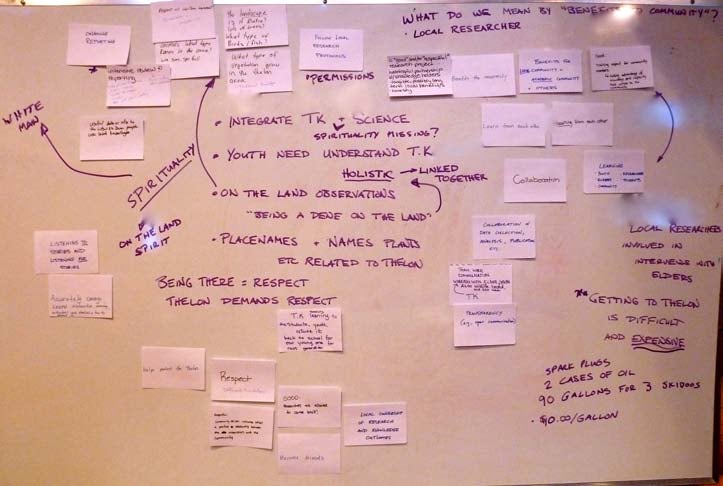
Figure 2. Initial image of a 'good' or 'respectful' research process
Emerging from the cue card exercise and discussion of ‘good’ and ‘respectful’ research was a framework for doing “research that can help being a Dene on the land” (see Figure 3). Seven components of the framework were identified by grouping cue cards that contained similar content (see Table 1).
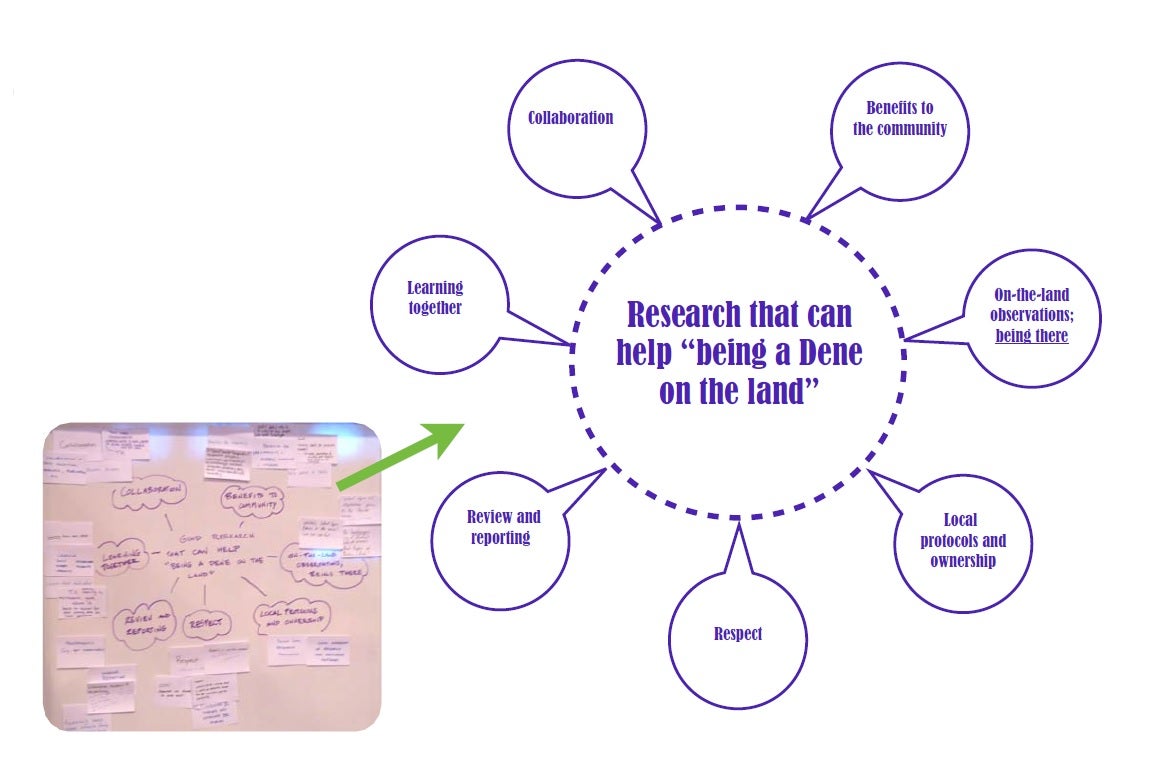
Figure 3. Framework for research that can help 'being Dene on the land'
| Collaboration |
team work; communication; working with elders, youth, WLEC; traditional knowledge; become friends; collaborate in data collection, analysis, publication, etc. |
| Learning together | learning from each other; learning (youth, elders, community, researchers, students); teaching and learning traditional knowledge; return Traditional Knowledge back to schools for our young ones for next generation |
| Review and reporting | transparency (e.g., open communication); ongoing reporting; intensive review and reporting (different ways of reporting - radio station, going to schools, feasts - not just public meetings); review everything before published; accurately convey Lutsel K’e Dene First Nation (LKDFN) relationship, meaning, activities, and stories and how to protect them |
| Respect | respect different knowledges; respect all caribou movement (pathways and migration); good researchers are allowed back!; community-drive outcomes reflect a positive relationship between the researchers and the community; listening to stories and listening for stories; honesty |
| Local protocals and ownership | follow local research protocols; local ownership of research and knowledge outcomes |
| On-the-land observations; being there | animals - what type roam in the area during different seasons?; what type of vegetation grows in the Thelon area?; balancing scientific knowledge and traditional knowledge; understanding landscape features (trees, wildlife, terrain) |
| Benefits to the commmunity |
tangible, possibly long-term benefits; meaningful partnerships with knowledge holders; useful data or information for LKDFN; using local knowledge; help protect the Thelon; training for community members - taking advantage of knowledge and capacity that comes from the community |
3. What are the main priorities for the Thelon River research project?
Workshop participants used the second cue card activity to identify and rank research priorities and desired learning outcomes. Images in the left sidebar illustrate how content on cue cards was ranked by participants using blue stickers. The more blue stickers a cue card received, the higher the priority. The images also shows broader priority themes that emerged when cue cards with similar foci were grouped together. The seven priority themes resulting from the activity and subsequent discussion are summarized as follows:
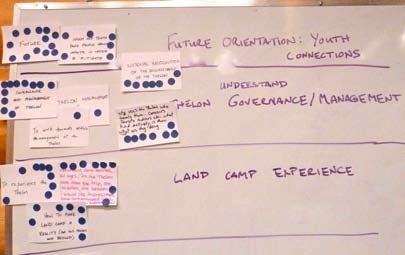
- Future orientations: youth connections
- The study must be future oriented. It can help to inform and teach young people about the sacred significance and national recognition of the Thelon, and how to mitigate against real and potential impacts.
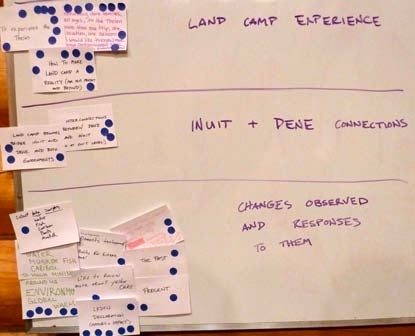
- Play a leading role in Thelon governance and management
- The study should promote local understanding of management issues (e.g., user information, monitoring) and support Lutsel K’e’s involvement in Thelon River governance.
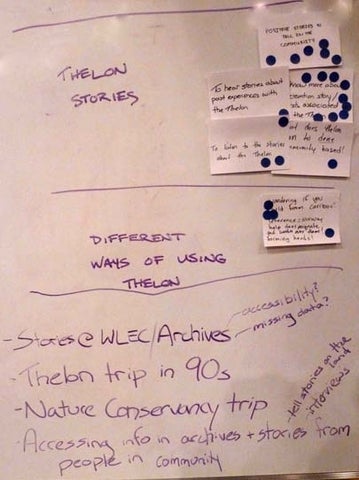
- Land camp experience
- The study should encourage Dene of all ages to return to the Thelon with their families. It can promote trips to different sites and in different seasons.
- Dene connections with Inuit
- The study, and specifically the land camp experience, can be a bridge between Dene and Inuit, and their respective representatives and governments.
- Changes observed and responses to them
- The study can enable enhanced knowledge of changes that have occurred, or are occurring, within the Thelon (e.g., with respect to impacts of climate change and mining on water, wildlife, or plants), and how Lutsel K’e has responded, or is responding, to these changes.
- Thelon stories
- The study should emphasize stories about Dene relationships to the Thelon River and encourage these stories to be told and heard within Lutsel K’e.
- Identifying and understanding different ways of using the Thelon
- The study can enable enhanced knowledge of different uses, and potential uses, of the Thelon River.
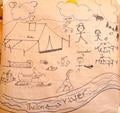
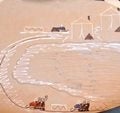
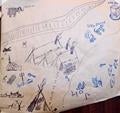
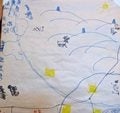
The drawing exercise proved to be a fun, interactive, and creative way for participants to express their ideas and expectations about the land camp experience. Four illustrative maps, shown above, were generated. Upon completion, each group explained the content of their map to the other workshop participants. The photograph above shows Joseph Catholique presenting the map that he was involved in creating.
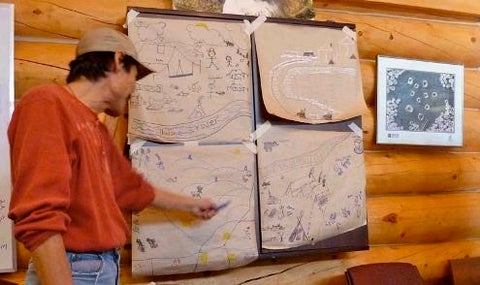
Overall, a number of similar and different expectations for the land camp were identified. Participants agreed that Whitefish Lake was an ideal location for a land camp in early spring (March 2015). This location and time would be ideal for traveling by snowmobile and sled, and require various supplies including tents (for sleeping, meeting, cooking), cooking stoves, axe, chainsaw, GPS, and extra snowmobile parts. It was agreed that the focus of the land camp should be teaching and learning, telling stories, and respecting the land and water. The idea of paying people to go to the land camp was discouraged. The clearest difference in expectations related to the number of people who would attend the land camp. In an ideal scenario, the camp would be accessible to families, people of all ages (elders, youth, children), hunters/land users, and researchers. This would present different logistical and financial challenges than a smaller land camp involving six to eight people, which is what the current funding is able to support.
5. Moving forward
The final component of the workshop was a discussion about strategies for moving forward with the research project and continuing to work together within a university and community research team. Key highlights from this discussion are organized into ‘desired outcomes’ and ‘next steps’
a. Desired outcomes
- A land camp experience that celebrates and teaches about Denesoline traditional knowledge and supports LKDFN involvement in co-managing the Thelon
- The study continues to focus on building relationships between university researchers and the LKDFN
- The LKDFN retains ownership of information collected during the study
- Academic papers resulting from the study are reviewed by LKDFN representatives prior to publication
- The role of LKDFN representatives in co-authoring academic publications shall be worked out at a later date
- Resources developed to support school curriculum (e.g., a book directed toward children and/or youth)
- Promotional materials developed for circulation within and beyond Lutsel K’e (e.g., Information pamphlets, website, or video)
- Facebook group or youth blog devoted to communicating research and land camp experience
- Community event that celebrates the land camp, Thelon stories, and participants’ research contribution
- Documentary film telling the story of the headwaters land camp (need to think of what scale of film)
- Ongoing reporting after each phase of the research, followed by a final summary report presented by university researchers in the community
b. Next steps
- Work with Mike Tollis to maintain open lines of communication between university researchers and LKDFN
- January 2014: prepare this research planning workshop report and develop a concise research plan for community review
- Winter 2014: submit application for ARI research license and UWaterloo research ethics clearance; work with WLEC to identify a Lutsel K’e research coordinator to assist with study; work with WLEC to develop a formal research agreement
- Spring/summer 2014: Begin documenting Denesoline knowledge and stories associated with the Thelon River
- Look for additional funding to support a more extensive land camp than current resources will allow

- LKDFN representatives will explore within their networks (e.g., Nature conservancy, mining companies, Native Communications Society)
- UWaterloo researchers will explore within their networks (e.g., other SSHRC grants)
- Spring 2015: Knowledge exchange land camp at the headwaters of the Thelon River (Whitefish Lake)